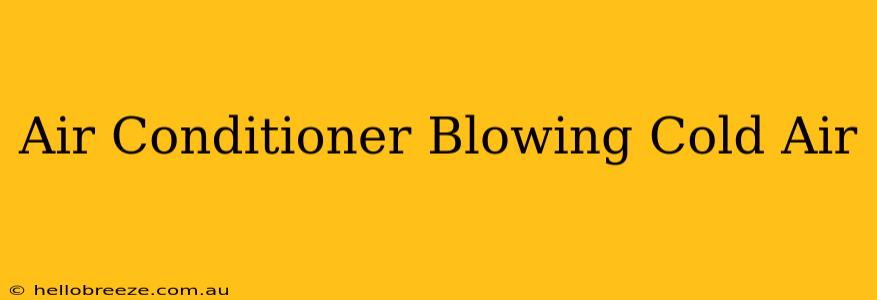Is your air conditioner blowing cold air? That's great news! But what if it's not blowing enough cold air, or only cold air in certain areas of your home? This comprehensive guide will help you troubleshoot common issues and get your AC blowing icy-cold air again. We'll cover everything from simple fixes you can do yourself to when it's time to call in a professional.
Understanding Your AC System
Before we dive into troubleshooting, let's briefly discuss how your AC system works. Your air conditioner uses refrigerant to cool the air. This refrigerant absorbs heat from inside your home and releases it outside. A properly functioning system is crucial for efficient cooling.
Key Components to Consider:
- Refrigerant Levels: Insufficient refrigerant is a common culprit for weak cooling. Low refrigerant levels can cause your AC to blow lukewarm air or stop cooling altogether.
- Air Filter: A clogged air filter restricts airflow, reducing the efficiency of your AC unit and leading to poor cooling.
- Condenser Coils: These outdoor coils release heat. Dirty coils restrict airflow and reduce cooling capacity.
- Evaporator Coils: Located inside, these coils absorb heat from the air within your home. Restricted airflow around these coils can also impact cooling performance.
- Compressor: The heart of your AC, the compressor circulates the refrigerant. A malfunctioning compressor can lead to significant cooling problems.
- Blower Motor: This component circulates the cooled air throughout your home. Problems with the blower motor will impact air distribution.
Troubleshooting Steps: Is Your AC Blowing Cold Air Effectively?
If your AC is blowing some cold air, but not enough, or the temperature isn't consistent throughout your home, follow these steps:
1. Check the Air Filter: The Easiest Fix
This is the first and easiest thing to check. A dirty air filter restricts airflow, making your AC work harder and potentially reducing its cooling power. Locate your air filter (usually accessible in the return air vent) and replace it with a clean one. This simple step can often dramatically improve cooling performance.
2. Inspect the Condenser Coils (Outdoor Unit):
The condenser coils need to be clean to function optimally. Accumulated dirt, leaves, and debris can severely restrict airflow. Gently clean the coils using a coil cleaning brush or a garden hose. Never use a high-pressure washer, as this can damage the delicate fins.
3. Examine the Evaporator Coils (Indoor Unit):
Access to the evaporator coils varies depending on your AC unit. If you can safely access them, check for any obstructions or excessive dirt. Cleaning may be necessary but is best left to a professional if you are unsure.
4. Assess Airflow: Is Your Air Moving Freely?
Check for any obstructions in your ductwork or vents that could be restricting airflow. Make sure vents aren't blocked by furniture or curtains. Ensure all registers are open and not restricted.
When to Call a Professional HVAC Technician:
While many issues can be addressed with simple DIY solutions, some problems require the expertise of a qualified HVAC technician. Call a professional if:
- Your AC is blowing warm air. This often points to more serious problems like refrigerant leaks or compressor failure.
- You've checked the easy fixes and cooling is still poor. After checking the air filter, coils, and airflow, your AC may still need professional attention.
- You're uncomfortable working with electrical components. Attempting repairs you're not qualified for can be dangerous.
Preventative Maintenance for Consistent Cold Air:
Regular maintenance is key to keeping your AC running efficiently and blowing cold air. Consider:
- Regular air filter changes: Change your air filter every 1-3 months, or as needed.
- Annual professional inspections: Schedule an annual inspection and maintenance check-up by an HVAC professional.
By following these troubleshooting steps and preventative maintenance practices, you can ensure your air conditioner keeps your home cool and comfortable all summer long! Remember, a properly functioning air conditioner is vital for a comfortable home environment.

